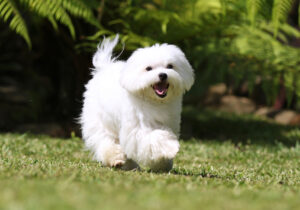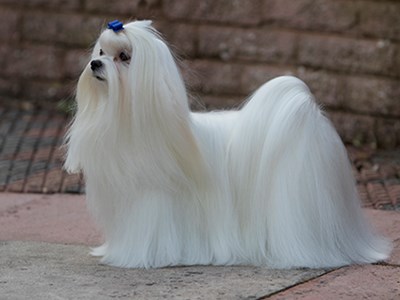Small but mighty presence, the Maltese have long been a beloved breed among dog enthusiasts. Its gentle and loving temperament and playful and energetic personality make it an ideal companion for families or single individuals. This article will uncover the distinct and charming Maltese temperament, examining what sets this breed apart and why it remains one of the most sought-after toy breeds globally.
Maltese is a small dog breed known for their affectionate and lively temperament. They are friendly, playful, and highly sociable dogs who bond closely with their owners. They are also intelligent and eager to please, making them easy to train.
Despite their small size, Maltese have a confident and fearless personalities and do not shy away from bigger dogs. They are also adaptable to various living situations and are suitable for apartment living as long as they get enough exercise and attention.
Regarding training, Maltese are highly intelligent and respond well to positive reinforcement techniques such as treats, praise, and play. They are quick learners and enjoy learning new tricks and obedience commands. It is essential to start training early and be consistent and patient, as Maltese can sometimes be stubborn. Socialization is also crucial for this breed, as it helps them develop into well-rounded and confident dogs.
It is also important to remember that Maltese are toy dogs with delicate bones, so they should not be subjected to rough play or excessive exercise. They also tend to bark at unfamiliar sights and sounds, so it is crucial to train them to refrain from barking excessively.
Maltese temperament

The Maltese is a toy breed of dog known for its friendly, affectionate, and playful temperament. They are intelligent and highly trainable, making them a popular choice for families and individuals looking for a small and well-behaved companion. Maltese are also known for their loyalty and attachment to their owners, which can sometimes make them wary of strangers.
In addition to their small size, they have a lot of energy and enjoy playing and exploring. They are generally good with children and other pets and make excellent lap dogs.
In addition to their friendly and playful personality, Maltese is also known for being confident and fearless. They have a strong desire to please their owners and are eager to learn new things. They are also highly adaptable and do well in a variety of living situations, from apartments to large homes with plenty of outdoor space. Maltese are also low-shedding and hypoallergenic, making them a good choice for people with allergies.
However, Maltese can be prone to specific health problems such as dental issues, eye infections, and shivering, and their long, silky coat requires frequent grooming. They can also be prone to separation anxiety and may become destructive if left alone for long periods.
Despite these challenges, the Maltese are a popular choice for those looking for a loving, loyal, and affectionate companion.
What is the temperament of a Maltese dog?
The Maltese is a toy breed of dog known for their gentle, playful, and affectionate temperament. They are good-natured, lively, and friendly, and they enjoy the company of their owners. They are also known for their gentleness, which makes them a good breed for families with children. Despite their small size, Maltese dogs are confident and brave and can be very protective of their owners.
However, they require regular grooming to keep their long, silky coat in good condition. The Maltese breed is known for being adaptable and suitable for various living environments, including apartments and smaller homes. They are also relatively low-maintenance in terms of exercise, as they are happy with just a few short daily walks and indoor playtime.
They are intelligent dogs that can efficiently train, but they can also be stubborn at times. Socialization from a young age is vital for Maltese dogs to help prevent fearfulness or shyness around new people and situations. They are also prone to separation anxiety, so they do best in homes where they will have plenty of human interaction.
Are Maltese dogs good with children?

Maltese dogs are generally good with children. They are a gentle and playful breed that can get along well with children of all ages. Their small size and friendly demeanor make them a good choice for families with kids.
However, to prevent accidents or injuries, it’s important to supervise interactions between young children and dogs, especially smaller breeds like the Maltese. It’s also important to teach children how to handle and treat pets with care and respect. With proper socialization and training, Maltese dogs can be great companions for families with children.
Additionally, Maltese dogs are known for their affectionate nature and their strong bond with their owners, which can extend to include the whole family, including children. They are a lively and playful breed, and their vibrant energy can be great fun for kids.
Moreover, it’s important to remember that, as with all dogs, individual personalities and temperaments can vary, and not all Maltese dogs may be suitable for households with children. It’s essential to carefully consider a dog’s personality and behavior before bringing them into a home with kids.
Socialization and training can also play a key role in helping a Maltese dog adjust to a household with children and vice versa.
Are Maltese dogs hypoallergenic?
Maltese dogs are considered to be hypoallergenic. This means that they produce fewer allergens than other breeds, making them a good choice for people who suffer from allergies. However, it’s important to note that no dog is entirely hypoallergenic, as all dogs produce some allergens, such as dander, urine, and saliva.
The hypoallergenic nature of Maltese dogs is due to their fine, silky coat, which does not shed much, and their low dander production. People with allergies should still spend time with a Maltese dog before committing to ownership to see if they react.
While Maltese dogs can be a good choice for people with allergies, it’s important to remember that individual tolerance to dog allergens can vary and that regular grooming is necessary to keep their coats in good condition.
Are Maltese dogs good apartment pets?

Yes, Maltese dogs are well-suited to apartment living. They are a small breed, typically weighing between 4-7 pounds, and they do not require a lot of exercises, making them a good choice for apartment dwellers. They are also adaptable dogs that are happy in various living environments and do not need much space to be content.
However, providing them with plenty of mental stimulation and socialization is vital to keep them happy and healthy in an apartment setting. Regular walks, indoor playtime, and interactive toys can help meet their physical and mental needs. With proper exercise and socialization, Maltese dogs can make great apartment pets.
How much exercise does a Maltese dog need?
Maltese dogs are a relatively low-energy breed and do not require a lot of exercises. A few short walks each day, and indoor playtime should be enough to meet their physical needs. They are well-suited to apartment living and do not need a large outdoor space to be happy.
Although they are small, they are playful and energetic, and they enjoy running and playing, so it’s crucial to provide them with opportunities to play and exercise. It’s also important to remember that regular exercise can help prevent behavioral problems, such as excessive barking or destructive chewing, and help maintain a healthy weight.
Overall, Maltese dogs do best with moderate exercise that provides both physical and mental stimulation.
How much grooming is required for a Maltese dog?

Maltese dogs have a long, silky coat that requires regular grooming to keep them in good condition. They are considered a high-maintenance breed in grooming, and their coat needs to be brushed daily to prevent matting and tangling. They may also require regular trimmings to keep their coat at a manageable length, and they may need to be professionally groomed every 4-6 weeks.
Regular baths and haircuts can help maintain the appearance of their coat and keep it healthy. It’s also important to clean their ears regularly and trim their nails to prevent discomfort or injury. Maltese dogs are prone to dental problems, so it’s crucial to brush their teeth regularly and provide them with dental chews or toys to keep their teeth and gums healthy.
In addition to their coat, Maltese dogs also need regular exercise and mental stimulation to stay happy and healthy. Maltese dogs require a significant amount of grooming to keep them looking and feeling their best.
Are Maltese dogs easy to train?
Maltese dogs are generally considered to be intelligent and easy to train. They are eager to please their owners and respond well to positive reinforcement training methods, such as treats and praise. They are also quick learners and can learn a variety of commands and tricks with patience and consistency.
However, like all dogs, individual personalities and temperaments can vary, and some Maltese dogs may be more challenging to train than others. It’s important to start training early and to be consistent and patient when working with a Maltese dog.
Socialization is also an essential part of training for any breed, and it’s vital to expose Maltese dogs to a variety of people, places, and experiences to help them become well-rounded, confident dogs. With patience, consistency, and positive reinforcement, Maltese dogs can be easily trained and make great companions.
Is a Maltese dog good for first-time owners?

Maltese dogs can be a good choice for first-time dog owners, as they are small in size, low-energy, and generally easy to train. They are also known for their affectionate and playful nature, which can make them great companions.
However, owning a dog, regardless of the breed, is a big responsibility and requires a significant time commitment. First-time owners should carefully consider their lifestyle, living arrangements, and ability to provide for a dog’s physical and emotional needs before committing to ownership.
Maltese dogs require regular grooming to keep their long, silky coat in good condition, and they need to be exercised and mentally stimulated regularly to stay happy and healthy.
They also require socialization to become well-rounded, confident dogs. With proper care and training, Maltese dogs can make great first-time pets, but it’s important to remember that owning a dog is a long-term commitment that should not take lightly.
Are Maltese dogs good watchdogs?
Maltese dogs are not typically considered to be good watchdogs. They are a small breed, typically weighing between 4-7 pounds, and they are not known for their protective instincts. While they may bark at unfamiliar sounds or people, they are not typically aggressive and are not likely to provide a strong deterrent against intruders.
Moreover, Maltese dogs are better known for their affectionate and playful nature and are typically more suited to be companions than watchdogs. If you’re looking for a dog to serve as a watchdog, many other breeds are more likely to fit the bill, including species such as German Shepherds, Rottweilers, and Doberman Pinschers are known for their protective instincts and bark less.
Maltese dogs can make excellent pets, but it’s important to remember that they are not ideal as watchdogs.
Are Maltese dogs good with other pets?

Maltese dogs can get along well with other pets, including cats and dogs, if they are adequately socialized from an early age. They are typically friendly and playful and enjoy other animals’ company.
However, like all dogs, individual personalities and temperaments can vary, and some Maltese dogs may be more aloof or aggressive toward other pets.
Socialization is an essential part of training for any breed, and it’s vital to expose Maltese dogs to a variety of people, places, and experiences, including other pets, to help them become well-rounded, confident dogs.
It’s also important to supervise interactions between Maltese dogs and other pets, especially during playtime, to ensure that everyone is safe and getting along well. With proper socialization and training, Maltese dogs can make excellent pets and get along well with other animals.
How long do Maltese dogs live?
Maltese dogs typically have a lifespan of 12-15 years. They can live a long and healthy life with proper care, nutrition, and regular veterinary check-ups. Like all dogs, genetics, lifestyle, and overall health can affect a Maltese dog’s lifespan, so it’s crucial to provide them with the best care.
Regular exercise, a balanced diet, and proper grooming are essential to maintaining their health and well-being. Regular veterinary check-ups can help detect and prevent potential health problems early and can also help extend their lifespan. With proper care, Maltese dogs can live long and happy lives and make great companions for many years.
Are Maltese dogs prone to certain health issues?

Maltese dogs can be prone to specific health issues. As with any breed, it’s essential to be aware of potential health concerns so that they can be detected and treated early. Some common health problems that Maltese dogs may face include:
1. Luxating patella: A condition where the knee cap pops out of place can cause pain and lameness.
2. Dental problems: Maltese dogs tend to develop tartar buildup and gum disease, which can lead to tooth loss if not properly managed.
3. Ear infections: Their long, floppy ears can be prone to infections if not properly cleaned and dried.
4. Shivering: Maltese dogs are prone to shivering due to their small size and tendency to feel the cold.
5. Liver shunts: A liver shunt is a congenital condition that can lead to various health problems, including seizures and stunted growth.
6. Eye problems: Maltese dogs can be prone to tear stains, which can cause discoloration and irritation around their eyes.
Regular veterinary check-ups and good preventive care can help reduce Maltese dogs’ risk of these and other health problems. If you’re considering a Maltese dog, choosing a reputable breeder who tests their dogs for common genetic health problems is essential. By taking good care of your Maltese dog and staying aware of potential health issues, you can help ensure that they live a long, healthy, and happy life.
Do Maltese dogs have a lot of energy?
Maltese dogs have a moderate energy level. They are an active breed and enjoy playing and exercising, but they are also known for their affectionate and laid-back nature. They do not require a lot of strenuous exercises, but they need regular physical activity and mental stimulation to stay healthy and happy.
A daily walk and playtime in the yard or park are usually enough to meet their exercise needs, but they also enjoy playing with toys and participating in agility training. Maltese dogs are also known for their adaptability, and they are generally able to adjust their energy levels to fit in with their owner’s lifestyle.
A Maltese dog can be a great fit whether you’re looking for a companion to join you on long hikes or a fun-loving pet to play with at home.
How much do Maltese dogs weigh?

Maltese dogs are small and typically weigh between 4-7 pounds (2-3 kg). They are a compact and lightweight breed with a delicate appearance and are known for their silky, flowing coat. Males tend to be slightly larger than females, but both genders typically fall within the same weight range.
Furthermore, Maltese dogs are one of the smallest breeds and are often referred to as “toy dogs.” They are well-suited to life in smaller spaces, such as apartments, and they are a popular choice for city dwellers and those who prefer a more low-maintenance pet. Regardless of their size, Maltese dogs are lively and active, and they make great companions for those who enjoy a small, playful pet.
Conclusion
In conclusion, Maltese is a charming and affectionate breed that makes a great companion for people of all ages. They are known for their cheerful and playful personality and their gentle and loving nature. With their moderate energy levels, they are well-suited to various lifestyles, from families with children to retirees and apartment dwellers.
While they require regular grooming to maintain their beautiful coat, they are generally low-maintenance pets that are easy to care for. With proper training and socialization, Maltese dogs can be well-behaved and obedient and are typically good with other pets and children.
The Maltese temperament is a delightful breed that can bring joy and companionship to anyone lucky enough to have one.


